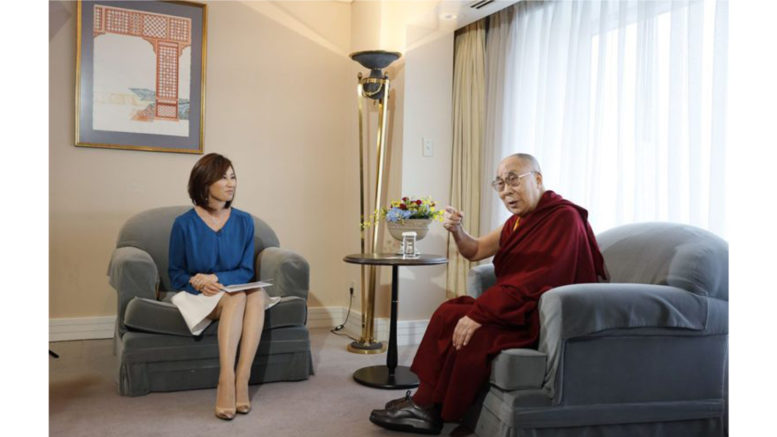Dharamshala: In an interview with NHK, one of Japan’s largest TV broadcasters this Tuesday, His Holiness the Dalai Lama said the question of his reincarnation was not an urgent concern, indicating by gesture that he’s in robust health.
As he was asked the question, His Holiness removed his glasses and replied playfully, “Look at my face, is the need to address the question of my reincarnation urgent?”
His Holiness also added in the interview that all options for choosing his reincarnation were open, including nominating an already living person as the successor.
Further on the selection process, His Holiness explained that as far back as 1969 he had made it clear that the choice of whether another Dalai Lama would be recognised rested with the Tibetan people. That choice precedes any decision about how a successor may be chosen. It could be that the traditional way of identifying a reincarnation will be followed, but there have also been cases of Lamas nominating an already living person as their successor.
He mentioned the upcoming meeting of Tibetan Buddhist leaders in Dharamshala at November end, which he said will primarily focus on raising the quality of Buddhist knowledge and practice but indicated that the question of his reincarnation may be on the agenda.
His Holiness is currently on a ten-day teaching tour in Japan. This is his 25th visit to the country.
In a second interview with President of Japan Institute of National Fundamentals, Yoshiko Sakurai, His Holiness discussed the current situations inside Tibet, self-immolation protests and the future of Tibet.
Responding to Ms Sakurai’s remarks on Chinese treatment of Tibetans and Uyghurs, His Holiness replied that he saw the past 70 years in terms of four eras affected by Mao Zedong, Deng Xiaoping, Jiang Zemin and Xi Jinping. Although the same party remained in power, guided by the same constitution, nevertheless great changes had taken place.
He remarked that there still remained room for further change. “1.2 million Chinese have a right to know what is really going on and when they know that, they can judge what’s right from what’s wrong.”
“In Tibet, even as suppression has increased, Tibetans have continued to pursue non-violence,” His Holiness said. He highlighted the cases of the more than 150 people who have committed self-immolation as examples, saying that they were very sad on the one hand, but on the other were worthy of admiration because they remained non-violent, at least in relation to others.
His Holiness stated firmly that the Tibetans resolved not to seek the independence of Tibet but to achieve genuine autonomy within the framework of the People’s Republic of China (PRC).

Ms Yoshiko Sakurai, president of the Japan Institute of National Fundamentals, interviewing His Holiness the Dalai Lama in Yokohama, Japan, 13 November 2018. Photo/Tenzin Choejor/OHHDL
“Since 1974 we haven’t been seeking independence for Tibet, being prepared instead to remain within the People’s Republic of China. Much has changed in China over the last 40 years. The number of Buddhists has grown to more than 300 million, many with an interest in Tibetan Buddhism. Meanwhile, even hardliners among the officials are in a dilemma about how to deal with Tibet. They see that 70 years of suppression and attempted brainwashing hasn’t diminished the Tibetan spirit.
“Instead of independence, we are seeking mutual benefit. The Chinese can help us with infrastructural development and we can help them with Buddhist psychology. So, our Middle Way Approach is an attempt to reach a mutual agreement for mutual improvement. Some Tibetans exercise their freedom to remain set on independence such as we enjoyed in 7th, 8th and 9th centuries.
“However, I am a great admirer of the spirit of the European Union that places the common interest of all its members above individual nation’s concerns. India too is a federation of states with different languages, cultures and religious traditions that are part of a union. I venture to imagine some kind of future union prevailing between India, China and Japan.”
His Holiness said he hoped for genuine autonomy to be granted in Uyghur, Mongol and Tibetan regions.
Addressing a question on how Japanese and Tibetans can contribute to the welfare of humanity, His Holiness offered his admiration for the Shinto Tradition and its appreciation of natural environment. He explored the possibility of combining technological development with a deep understanding of the workings of the mind to enable more people to find inner peace.
His Holiness expressed hope for Japan, as a country that has endured a nuclear attack, to lead efforts towards denuclearisation.
The report is sourced from dalailama.com.

Ms Yoshiko Sakurai, president of the Japan Institute of National Fundamentals, and His Holiness the Dalai Lama share a greeting before the interview, Yokohama, Japan, 13 November 2018. Photo/Tenzin Choejor/OHHDL

His Holiness the Dalai Lama poses for a photo with the members of the production team after his interview with Ms Yoshiko Sakurai, president of the Japan Institute of National Fundamentals, in Yokohama, Japan, 13 November 2018. Photo/Tenzin Choejor/OHHDL

